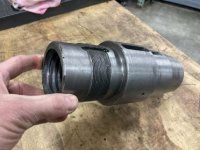Bread
Aluminum
- Joined
- Oct 4, 2013
- Location
- Ballard, WA
Working on a 40's or 50's Fosdick hydraulic radial arm drill. It's the 8', which is biggest in their lineup. When I arrived the nut was worn and tripping the anti-drop mechanism. So I pulled the nut out to machine a new one, and discovered it was made of cast iron. I've never seen that before. Every drill press, knee mill, lathe and horizontal milling machine I've ever repaired has had a bronze nut. The shop I use for all my ACME nut work hasn't seen cast iron either, but suspected it could be a wartime machine. Acme nuts are typically a bronze alloy, silicon bronze perhaps.
I found a book on ebay, but it does not specify the material. So we went ahead and made the new nut out of the same material, cast iron. I dressed the galled portions of screw thoroughly in the lathe, and checked the fit of the new nut along the full length of the screw dry. Was very smooth. Went ahead and oiled the screw and nut with heavy oil and put it back together. I did not use the typical ISO 68 Vactra #2 way oil. The machine tag specifies a much heavier oil, 140-160 SUV at 210 f, which crosses to an SAE 140, or ISO 460. I went with Mobilgear 600 XP460. This stuff is thick like honey. There is an oil pot surrounding the top side of the screw. I filled that pot and let it sit over the weekend, then filled it again. It's a total loss system so it just drips past the threads and onto the machine base.
Testing did not go well. We ran the machine and elevated the nut a couple feet. Was some squeeling and chatter. I mechanically disabled the column clamp to eliminate that as an issue. Ran it up and down a bit more, which was ok, then no more movement. I put my hand on the elevating screw above the nut and it's physically hot to the touch. Way too much friction! The oil is full of particles, and this is after 30 seconds of use. Looks like lapping compound.
Now we're in a bad spot. In my mind, this nut should be made of bronze. Even dry bronze won't gall this badly, regardless of what type of oil is used. Looking for advice from the more experienced guys.
FYI I also went through the hyraulic system and had the motor and valve gone though. The hydraulic system is building pressure per the spec in the manual.


I found a book on ebay, but it does not specify the material. So we went ahead and made the new nut out of the same material, cast iron. I dressed the galled portions of screw thoroughly in the lathe, and checked the fit of the new nut along the full length of the screw dry. Was very smooth. Went ahead and oiled the screw and nut with heavy oil and put it back together. I did not use the typical ISO 68 Vactra #2 way oil. The machine tag specifies a much heavier oil, 140-160 SUV at 210 f, which crosses to an SAE 140, or ISO 460. I went with Mobilgear 600 XP460. This stuff is thick like honey. There is an oil pot surrounding the top side of the screw. I filled that pot and let it sit over the weekend, then filled it again. It's a total loss system so it just drips past the threads and onto the machine base.
Testing did not go well. We ran the machine and elevated the nut a couple feet. Was some squeeling and chatter. I mechanically disabled the column clamp to eliminate that as an issue. Ran it up and down a bit more, which was ok, then no more movement. I put my hand on the elevating screw above the nut and it's physically hot to the touch. Way too much friction! The oil is full of particles, and this is after 30 seconds of use. Looks like lapping compound.
Now we're in a bad spot. In my mind, this nut should be made of bronze. Even dry bronze won't gall this badly, regardless of what type of oil is used. Looking for advice from the more experienced guys.
FYI I also went through the hyraulic system and had the motor and valve gone though. The hydraulic system is building pressure per the spec in the manual.









